英语学习基本句到复杂句(定语从句,状语从句,宾语从句)
英语五种基本句型到复杂句型
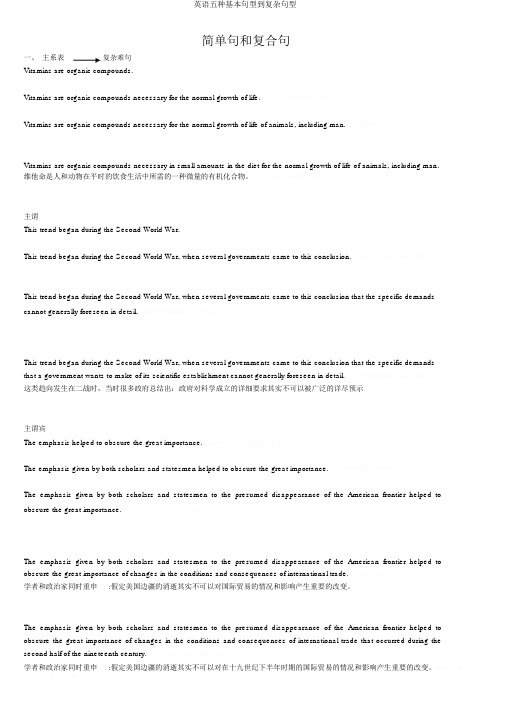
简单句和复合句一、主系表复杂难句Vitamins are organic compounds.Vitamins are organic compounds necessary for the normal growth of life.Vitamins are organic compounds necessary for the normal growth of life of animals, including man.Vitamins are organic compounds necessary in small amounts in the diet for the normal growth of life of animals, including man. 维他命是人和动物在平时的饮食生活中所需的一种微量的有机化合物。
主谓This trend began during the Second World War.This trend began during the Second World War, when several governments came to this conclusion.This trend began during the Second World War, when several governments came to this conclusion that the specific demands cannot generally foreseen in detail.This trend began during the Second World War, when several governments came to this conclusion that the specific demands that a government wants to make of its scientific establishment cannot generally foreseen in detail.这类趋向发生在二战时,当时很多政府总结出:政府对科学成立的详细要求其实不可以被广泛的详尽预示主谓宾The emphasis helped to obscure the great importance.The emphasis given by both scholars and statesmen helped to obscure the great importance.The emphasis given by both scholars and statesmen to the presumed disappearance of the American frontier helped to obscure the great importance.The emphasis given by both scholars and statesmen to the presumed disappearance of the American frontier helped to obscure the great importance of changes in the conditions and consequences of international trade.学者和政治家同时重申:假定美国边疆的消逝其实不可以对国际贸易的情况和影响产生重要的改变。
英语从句(状语从句、宾语从句、定语从句)
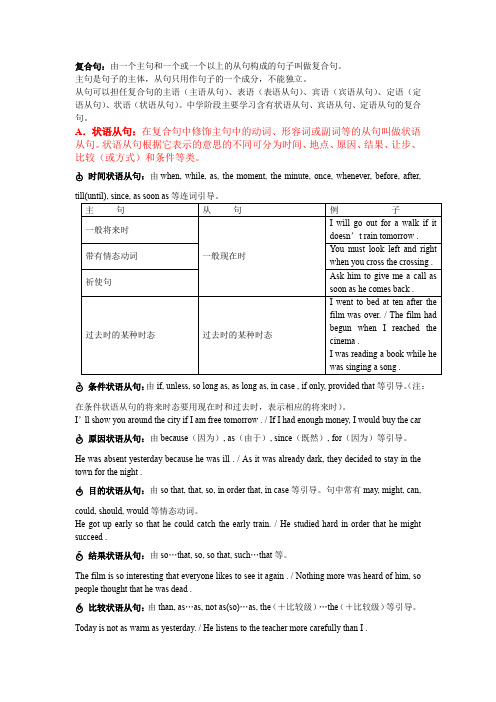
复合句:由一个主句和一个或一个以上的从句构成的句子叫做复合句。
主句是句子的主体,从句只用作句子的一个成分,不能独立。
从句可以担任复合句的主语(主语从句)、表语(表语从句)、宾语(宾语从句)、定语(定语从句)、状语(状语从句)。
中学阶段主要学习含有状语从句、宾语从句、定语从句的复合句。
A.状语从句:在复合句中修饰主句中的动词、形容词或副词等的从句叫做状语从句。
状语从句根据它表示的意思的不同可分为时间、地点、原因、结果、让步、比较(或方式)和条件等类。
○1时间状语从句:由when, while, as, the moment, the minute, once, whenever, before, after,○2条件状语从句:由if, unless, so long as, as long as, in case , if only, provided that等引导。
(注:在条件状语从句的将来时态要用现在时和过去时,表示相应的将来时)。
I’ll show you around the city if I am free tomorrow . / If I had enough money, I would buy the car○3原因状语从句:由because(因为), as(由于), since(既然), for(因为)等引导。
He was absent yesterday because he was ill . / As it was already dark, they decided to stay in the town for the night .○4目的状语从句:由so that, that, so, in order that, in case等引导。
句中常有may, might, can,could, should, would等情态动词。
He got up early so that he could catch the early train. / He studied hard in order that he might succeed .○5结果状语从句:由so…that, so, so that, such…that等。
初高中英语宾语从句、状语从句及定语从句

第七章复合句(宾语从句、状语从句、定语从句)宾语从句考点集汇,讲解和训练一. 宾语从句的种类宾语从句是一种名词性从句,在句中作及物动词的宾语,或介词的宾语,或形容词的宾语。
根据引导宾语从句的不同连词,宾语从句可分为三类。
1. 由that引导的宾语从句。
That只有语法作用,没有实在的意义,在口语和非正式文体中可以省略。
例如:He said (that) he wanted to stay at home.She doesn’t know (that) she is seriously ill.I am sure (that) he will succeed.2. 由连接代词who, whom, whose, what, which和连接副词when, where, why, how引导的宾语从句。
这些连接代词和连接副词在宾语从句中充当某个成分。
例如:Do you know who (whom) they are waiting foe?He asked whose handwriting was the best.Can you tell me where the No.3 bus stop is?I don’t know why the train is late.3. 由if或whether引导的宾语从句。
If和whether在句中的意思是“是否”。
例如:I want to know if (whether) he lives there.He asked me whether (if) I could help him.二. 宾语从句的语序宾语从句的语序应为陈述句的语序。
例如:I hear (that) physics isn’t easy.I think (that) you will like this school soon.Can you tell me how I can get to zoo?Please tell me when we’ll have the meeting.三. 宾语从句的时态1. 如果主句的时态是一般现在时,宾语从句该用什麽时态就用什麽时态。
英语学习基本句到复杂句(定语从句,状语从句,宾语从句)

简单句和复合句一、从简单词到复合句主语句子充当主语主语从句宾语句子充当宾语宾语从句句词性从句表语句子充当表语表语从句同位语句子充当同位语同位语从句三大类根本从句定语句子充当定语定语从句状语句子充当状语状语从句Example:技术类型:1. I really need to learn how to concentrate/focus on one thing at a time to improve the efficiency of the workThe goal of the code change on PE load line was that there is no code change in the CI package built.2. Assuming that MSRN keeps unchanged as long as it stays in the same VLR area, a copy of MSRN can be held on HLR and only needs to be updated when the UE moves to a new VLR area.3. Calls that were still in the alerting state or on hold were not transferred. Calls where the subscriber was the controller of a conference call may still be transferred per the 3GPP procedures, however, the fact that the subscriber may be the controller for a conference was not known to the MSC, so the decision to allow such a call to be transferred would be up to the SCC AS.4. Upon receipt of a SIP INFO, if the body has the Content-Type header containing‘application/vnd.3gpp.state-and-event-info+xml’ and a XML body compliant to the XML schema specified in the TS 24.237 Section D.2 with the state-info XML element containing ‘early’ and direction XML element containing ‘initiator’, the WCS shall perform the followings.5. She didn’t realize the fact.〔The girl who was taken care of by her grandmother〕I didn't realize how special my mother was until I became an adult.在复合句中作主句的宾语,引导词有:连词:that (that 常可省略),whether, if代词:who, whose, what ,which副词:when ,where, how, why 等。
英语中的复杂句也叫多重句一分钟教你分析它的句子成分
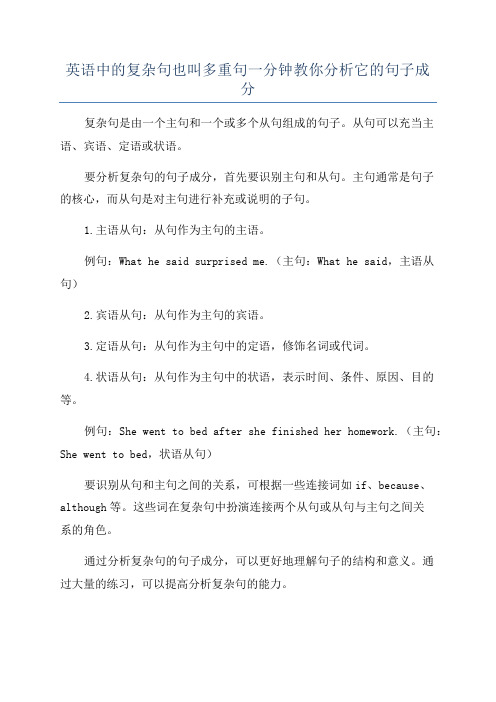
英语中的复杂句也叫多重句一分钟教你分析它的句子成
分
复杂句是由一个主句和一个或多个从句组成的句子。
从句可以充当主语、宾语、定语或状语。
要分析复杂句的句子成分,首先要识别主句和从句。
主句通常是句子
的核心,而从句是对主句进行补充或说明的子句。
1.主语从句:从句作为主句的主语。
例句:What he said surprised me.(主句:What he said,主语从句)
2.宾语从句:从句作为主句的宾语。
3.定语从句:从句作为主句中的定语,修饰名词或代词。
4.状语从句:从句作为主句中的状语,表示时间、条件、原因、目的等。
例句:She went to bed after she finished her homework.(主句:She went to bed,状语从句)
要识别从句和主句之间的关系,可根据一些连接词如if、because、although等。
这些词在复杂句中扮演连接两个从句或从句与主句之间关
系的角色。
通过分析复杂句的句子成分,可以更好地理解句子的结构和意义。
通
过大量的练习,可以提高分析复杂句的能力。
高中英语语法专题知识点梳理总结与练习(并列句、定语从句、名词性从句、状语从句)
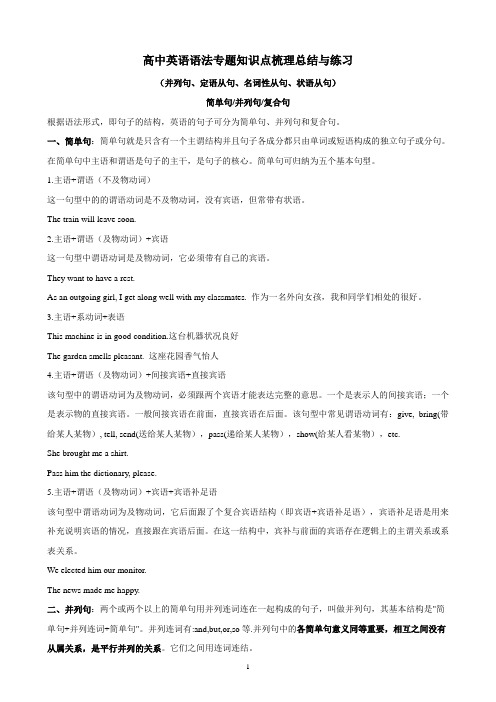
高中英语语法专题知识点梳理总结与练习(并列句、定语从句、名词性从句、状语从句)简单句/并列句/复合句根据语法形式,即句子的结构,英语的句子可分为简单句、并列句和复合句。
一、简单句:简单句就是只含有一个主谓结构并且句子各成分都只由单词或短语构成的独立句子或分句。
在简单句中主语和谓语是句子的主干,是句子的核心。
简单句可归纳为五个基本句型。
1.主语+谓语(不及物动词)这一句型中的的谓语动词是不及物动词,没有宾语,但常带有状语。
The train will leave soon.2.主语+谓语(及物动词)+宾语这一句型中谓语动词是及物动词,它必须带有自己的宾语。
They want to have a rest.As an outgoing girl, I get along well with my classmates. 作为一名外向女孩,我和同学们相处的很好。
3.主语+系动词+表语This machine is in good condition.这台机器状况良好The garden smells pleasant. 这座花园香气怡人4.主语+谓语(及物动词)+间接宾语+直接宾语该句型中的谓语动词为及物动词,必须跟两个宾语才能表达完整的意思。
一个是表示人的间接宾语;一个是表示物的直接宾语。
一般间接宾语在前面,直接宾语在后面。
该句型中常见谓语动词有:give, bring(带给某人某物), tell, send(送给某人某物),pass(递给某人某物),show(给某人看某物),etc.She brought me a shirt.Pass him the dictionary, please.5.主语+谓语(及物动词)+宾语+宾语补足语该句型中谓语动词为及物动词,它后面跟了个复合宾语结构(即宾语+宾语补足语),宾语补足语是用来补充说明宾语的情况,直接跟在宾语后面。
在这一结构中,宾补与前面的宾语存在逻辑上的主谓关系或系表关系。
初中英语语法宾语、定语、状语从句总结

初中英语语法宾语、定语、状语从句总结- 1 -宾语从句一、定义在句子中起宾语作用的从句叫做宾语从句。
二、连接词that: I think that you can pass the exam.Whether/if: I don’t know what the word means.“Wh”: I don’t know what the word means.I don’t know where he found the book.只用whether的情况:1. 与or not连用:I don’t know whether it’s raining or not.2. 与动词不定式连用:He doesn’t know whether to accept the invitation.3. 连接词前有介词时:It depends>三、时态1. 主句是一般现在时态,从句根据实际情况而定(各种时态均可) She wants to know what he has done for the exam.2.主句是一般过去时态,从句用相应的过去的时态。
1)She said that she was a student.2)She said that she would fly to Japan in a week.3)She said that she had finished her homework already.3. 如果宾语从句说的是客观真理、自然现象或事实时,这时宾语从句要用一般现在时态。
The teacher said that the earth goes round the sun.- 2 -定语从句一、定义在复合句中修饰名词、代词的从句叫定语从句。
二、先行词先行词指人who /that先行词指物which/ that定语从句一般紧跟被修饰的名词或代词(即先行词)后三、关系代词关系代词代替先行词在句子中担当成分,所以从句中不可再出现其他代替先行词的代词四、翻译方法“….的”Whom: 先行词指人,则代替先行词在定语从句中充当宾语(包括介词的宾语), 与who的区别是如果前面带介词则必须用whom1. This is the teacher whomwho we like best.2. I don’t like the boy to whom you are talking.Whose : 指人或物,作定语,表示“…的”eg: Harry is the boy whose mother is our math teacher.关系代词只能that 的特殊情况:1.先行词前有序数词修饰时:This is the first gift that my parents bought me.2.先行词前有形容词最高级修饰时:This is the most exciting film that I have ever seen.3. 先行词是不定代词something, anything等时.e.g. Is there anything that you want in this shop4. 先行词是人和物时, 用that.e.g. He talked about some writers and books that were unknown to us all.5. 先行词被all , little , the>e.g. This is the last place that I want to visit.6. 特殊疑问句以who 或which 开头,只能用that引导.Who is the girl that is making a speech>当关系代词前使用介词时:物+介词+which ; 人+ 介词+ whom当关系代词前使用介词时:e.g. 1. This is the train by which we went to Beijing.2. This is the teacher to whom my mother is talking.- 3 -状语从句一、定义在复合句中由从句表示的状语称作状语从句,它可以用来修饰谓语(包括非谓语动词)、定语或状语,或是整个句子。
英语学习基本句到复杂句(定语从句,状语从句,宾语从句)
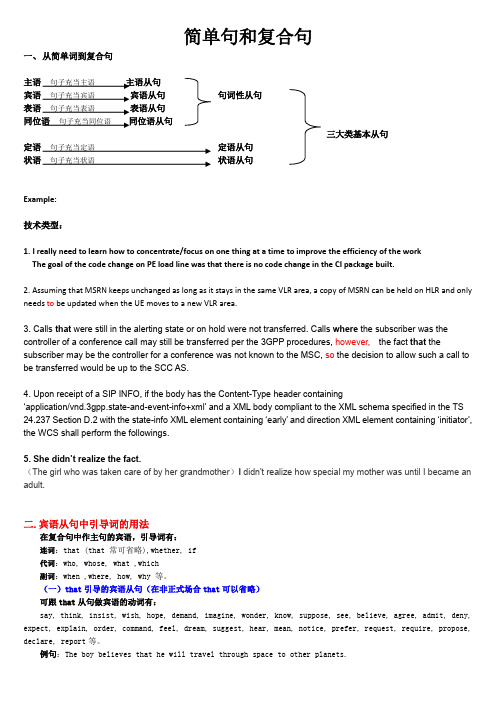
简单句和复合句一、从简单词到复合句主语句子充当主语主语从句宾语句子充当宾语宾语从句句词性从句表语句子充当表语表语从句同位语句子充当同位语同位语从句三大类基本从句定语句子充当定语定语从句状语句子充当状语状语从句Example:技术类型:1. I really need to learn how to concentrate/focus on one thing at a time to improve the efficiency of the workThe goal of the code change on PE load line was that there is no code change in the CI package built.2. Assuming that MSRN keeps unchanged as long as it stays in the same VLR area, a copy of MSRN can be held on HLR and only needs to be updated when the UE moves to a new VLR area.3. Calls that were still in the alerting state or on hold were not transferred. Calls where the subscriber was the controller of a conference call may still be transferred per the 3GPP procedures, however, the fact that the subscriber may be the controller for a conference was not known to the MSC, so the decision to allow such a call to be transferred would be up to the SCC AS.4. Upon receipt of a SIP INFO, if the body has the Content-Type header containing‘application/vnd.3gpp.state-and-event-info+xml’ and a XML body compliant to the XML schema specified in the TS 24.237 Section D.2 with the state-info XML element containing ‘early’ and direction XML element containing ‘initiator’, the WCS shall perform the followings.5. She didn’t realize the fact.(The girl who was taken care of by her grandmother)I didn't realize how special my mother was until I became an adult.二.宾语从句中引导词的用法在复合句中作主句的宾语,引导词有:连词:that (that 常可省略),whether, if代词:who, whose, what ,which副词:when ,where, how, why 等。
高中英语语法,五大基本句型,定语从句,名词性从句,状语从句,强调结构,倒装句

五大基本句型1.主(n./pron./to do sth/doing sth/主语从句)——谓(vi.如:come, go, arrive, stay, work, fall, rise, die, happen, fail, appear,lie,sit,stand,last)(1).The sun rises in the east and sets in the west.(2).Your brother has gone home.(3).We work hard at English.2.主-------谓(vt.如:visit, spend, forget, raise,have,seat,astonish,satisfy,embarass)-----宾(n./ pron./to do sth/doing sth/宾语从句)(1).I study chemistry and he studies physics.(2).I have never seen such an interesting film.(3).He doesn't know what to read.3.主-------谓(vt.)------间接宾语(sb)-------直接宾语(sth.)(1).Give sb sth=Give sth to sb: send, pass, hand, show(2).Buy sb sth=Buy sth for sb: make, get, cook, call, find(3).Ask sb sth=Ask sth of sb(1).Will you lend me your bike?(2).Peter bought Mary a new dress.(3).Please get him some hot water.(4).Will you tell us sth about your school life?(5).This little boy is always asking the teacher all sorts of questions.(6).Pass me the paper, please.John is teaching Mary how to ride a bicycle.4.主-----谓(vt.)-------宾-------补(n./adj/adv/介词短语/to do sth----如:ask, tell, order,want, wish, encourage, allow, forbid/Do sth----如:“四看”、“二听”、“一感觉”;have, let 与make /Doing sth/Done by sb.)(1).I saw her enter the lab.(2).Nathan Hale felt his heart beating fast.(3).We elected him our school headmaster.(4).The students often keep their classroom clean and tidy.I'll have the bike repaired.I heard him singing happily in the next room.That man made the boy obey him.He painted the door red.She found her bike stolen.let me have a look. We call her Xiao li.We asked them to stay for lunch.I wish you to go with me.Don't keep your mother waiting.suddenly she saw a wallet lying on the ground.When he woke up, he found himself tied down.5.主-----系(be/look,smell,taste,sound,feel/prove,remain,stay,keep/turn,get,become,make)----表。
高中英语家教备课资料 高中英语基础语法第十一课:简单句、复合句、复杂句(仅名词性从句)

1、简单句:必须具备主谓结构并且主语一定是谓语动作的发出者,如果有宾语的话,宾语一定是谓语的承受者。
2、复合句/并列句:简单句的叠加,句子间为并列关系基本结构:分句+并列连词+分句并列连词分类:1、并列、递进:and、both...and...等2、转折:but、yet、while等3、选择:or、either...or...、otherwise等4、因果:for、so有时不用并列连词,而是用分号、冒号等把分句隔开。
祈使句,and/or+主谓结构3、复杂句:句子嵌套,句子间是从属关系,从而形成了主句和从句之分主语从句,宾语从句,表语从句,同位语从句,./////定语从句,状语从句(名词性从句)(1)主语从句引导主语从句的连接词:从属连词that、whether、if;连接代词what、who、whom、whose、whatever、whichever、whoever等;连接副词when、where、why、how、whenever等。
①It + be +形容词(necessary/likely/important/uncertain等)+ that从句②It + be + 名词(短语)(a pity/no wonder/ no surprise等) + that从句③It + be + 过去分词(said/ reported/decided/believed等) + that从句④It+不及物动词( seems/ appears/ happens等) + that从句只用Whether的两种情况:①句首②whether... or not③介词+ whether 从句(2)宾语从句●引导宾语从句的连接词:从属连词that、whether、if;连接代词what、who、whose、whatever、whichever、whoever等;连接副词when、where、why、how等。
从句用陈述句语序。
英语中的简单句、复合句、复杂句
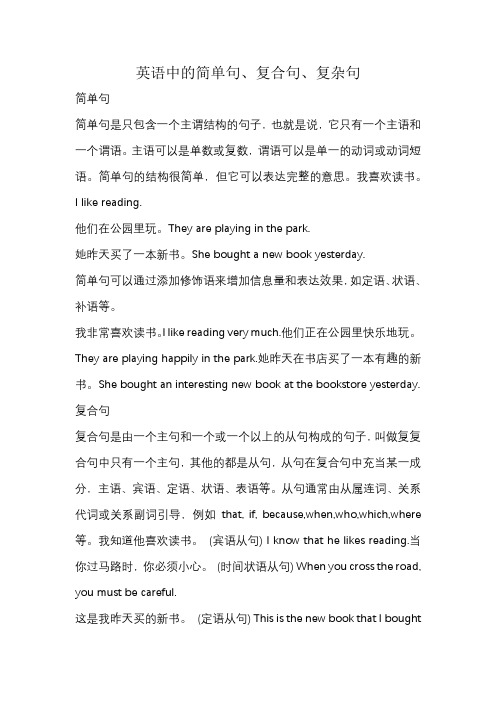
英语中的简单句、复合句、复杂句简单句简单句是只包含一个主谓结构的句子,也就是说,它只有一个主语和一个谓语。
主语可以是单数或复数,谓语可以是单一的动词或动词短语。
简单句的结构很简单,但它可以表达完整的意思。
我喜欢读书。
I like reading.他们在公园里玩。
They are playing in the park.她昨天买了一本新书。
She bought a new book yesterday.简单句可以通过添加修饰语来增加信息量和表达效果,如定语、状语、补语等。
我非常喜欢读书。
l like reading very much.他们正在公园里快乐地玩。
They are playing happily in the park.她昨天在书店买了一本有趣的新书。
She bought an interesting new book at the bookstore yesterday. 复合句复合句是由一个主句和一个或一个以上的从句构成的句子,叫做复复合句中只有一个主句,其他的都是从句,从句在复合句中充当某一成分,主语、宾语、定语、状语、表语等。
从句通常由从属连词、关系代词或关系副词引导,例如that, if, because,when,who,which,where 等。
我知道他喜欢读书。
(宾语从句) I know that he likes reading.当你过马路时,你必须小心。
(时间状语从句) When you cross the road, you must be careful.这是我昨天买的新书。
(定语从句) This is the new book that I boughtyesterday.复合句可以包含多个从句,从属于不同的层次,形成复杂的结构。
我认为他说的是真的。
(宾语从句) I think that what he said is true.(宾语从何中包含主语从句)他告诉我他为什么迟到了。
英语语法之定语从句、状语从句、宾语从句;数词句型分类及应用;初中优秀作文
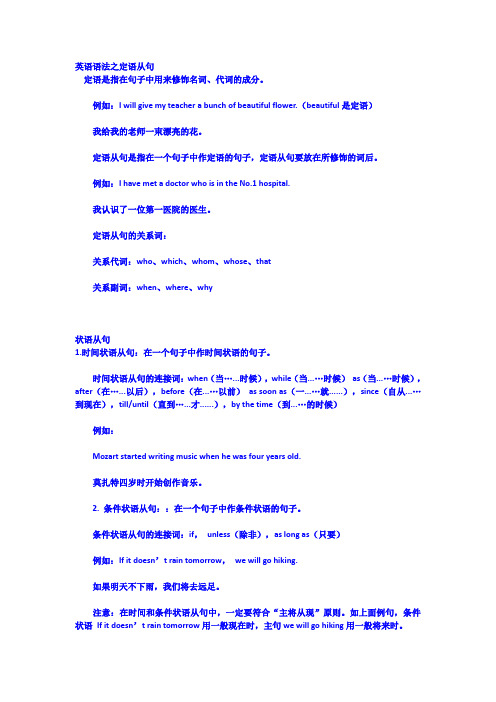
英语语法之定语从句定语是指在句子中用来修饰名词、代词的成分。
例如:I will give my teacher a bunch of beautiful flower.(beautiful是定语)我给我的老师一束漂亮的花。
定语从句是指在一个句子中作定语的句子,定语从句要放在所修饰的词后。
例如:I have met a doctor who is in the No.1 hospital.我认识了一位第一医院的医生。
定语从句的关系词:关系代词:who、which、whom、whose、that关系副词:when、where、why状语从句1.时间状语从句:在一个句子中作时间状语的句子。
时间状语从句的连接词:when(当…...时候),while(当...…时候)as(当...…时候),after(在…...以后),before(在...…以前)as soon as(一...…就......),since(自从...…到现在),till/until(直到…...才......),by the time(到...…的时候)例如:Mozart started writing music when he was four years old.莫扎特四岁时开始创作音乐。
2. 条件状语从句::在一个句子中作条件状语的句子。
条件状语从句的连接词:if,unless(除非),as long as(只要)例如:If it doesn’t rain tomorrow,we will go hiking.如果明天不下雨,我们将去远足。
注意:在时间和条件状语从句中,一定要符合“主将从现”原则。
如上面例句,条件状语If it doesn’t rain tomorrow用一般现在时,主句we will go hiking用一般将来时。
3. 原因状语从句:在一个句子中作原因状语的句子。
原因状语从句的连接词:because,since,as,now that例如:I didn’t go to school yesterday because I was ill.因为我生病了,所以昨天没去上学。
语法中的复杂句解析主语从句宾语从句表语从句

语法中的复杂句解析主语从句宾语从句表语从句语法中的复杂句解析——主语从句、宾语从句、表语从句复杂句是由一个主句和一个或多个从句构成的句子。
主语从句、宾语从句和表语从句是构成复杂句的常见从句类型。
它们在句子中分别充当主语、宾语和表语的角色,对句子的主要成分进行补充和扩展。
本文就主语从句、宾语从句和表语从句进行详细解析。
一、主语从句主语从句是一个从句在句子中充当主语的角色。
一般来说,关系代词"what/that/which"和连词"whether/if"引导的从句都可以作为主语从句。
例句1:What she said surprised me. (她所说的让我感到惊讶。
)例句2:That you are here means a lot to me. (你在这里对我意味着很重要。
)主语从句在句子中起到承担动作或状态的作用,就像一个实体,对整个句子进行支撑。
它可以让句子更加丰富、具体和生动。
二、宾语从句宾语从句是一个从句在句子中充当宾语的角色。
常见的宾语动词有:believe, hope, think, know, realize, wonder等。
宾语从句一般由关系词"that/whether/if"引导,也可以由特定的疑问词引导。
例句1:I believe (that) he is the right person for the job. (我相信他是这份工作的合适人选。
)例句2:I wonder if it will rain tomorrow. (我想知道明天是否会下雨。
)宾语从句起到完整整个句子意义的作用,被宾语动词所支配和引导。
通过宾语从句,句子的表达更加清晰明了。
三、表语从句表语从句是一个从句在句子中充当表语的角色。
常见的系动词有:be, seem, appear, become, feel等。
表语从句一般由关系词"that/whether"或特定的疑问词引导。
初高中英语衔接之复合句(宾从、状从、定从)

初高中英语衔接之复合句(宾从、状从、定从)宾语从句考点集汇,讲解和训练一. 宾语从句的种类宾语从句是一种名词性从句,在句中作及物动词的宾语,或介词的宾语,或形容词的宾语。
根据引导宾语从句的不同连词,宾语从句可分为三类。
1. 由that引导的宾语从句。
That只有语法作用,没有实在的意义,在口语和非正式文体中可以省略。
例如:He said (that) he wanted to stay at home.She doesn’t know (that) she is seriously ill.I am sure (that) he will succeed.2. 由连接代词who, whom, whose, what, which和连接副词when, where, why, how引导的宾语从句。
这些连接代词和连接副词在宾语从句中充当某个成分。
例如:Do you know who (whom) they are waiting foe?He asked whose handwriting was the best.Can you tell me where the No.3 bus stop is?I don’t know why the train is late.3. 由if或whether引导的宾语从句。
If和whether在句中的意思是“是否”。
例如:I want to know if (whether) he lives there.He asked me whether (if) I could help him.二. 宾语从句的语序宾语从句的语序应为陈述句的语序。
例如:I hear (that) physics isn’t easy.I think (that) you will like this school soon.Can you tell me how I can get to zoo?Please tell me when we’ll have the meeting.三. 宾语从句的时态1. 如果主句的时态是一般现在时,宾语从句该用什麽时态就用什麽时态。
英语三大从句:怎样区分定语从句,宾语从句和状语从句(附习题)

英语三大从句:怎样区分定语从句,宾语从句和状语从句(附习题)我被学生最常问到的问题之一,就是怎样区分定语从句,宾语从句和状语从句。
今天我们对前面几节课的内容做一些提炼,探讨下怎样一眼就能辨别三大从句。
01 概念3大从句的区别均在于前面两个字:定语、宾语和状语:打开今日头条,查看更多图片知道了这几个概念,这三种从句就很好理解了:定语从句:作定语/ adj.修饰先行词;在这里,dog “狗子” 是先行词,即“走在定语从句前面的名词”;定语从句 that shits a lot 其中的 that,指代了前面的 dog,告诉我们这是一条怎样的狗子:拉很多的狗子。
宾语从句:作宾语,放在动词或介词后面;第一句,宾语从句为普通的陈述句,放在think 这个动作后面,由连接词 that 引导。
第二句,宾语从句已经改成陈述句语序,原来人讲的话则是一般疑问句Do you let it go “你丫放不放手” ?该从句放在 depend on 的介词 on 后面,一般疑问句由 whether/ if 引导。
状语从句:作状语,给主句增加信息量。
状语从句,是3大从句中比较好记的一种:有个完整的主句,从句是提供更多信息的,比如上述例句告诉我们他为什么养狗。
只要熟悉九大状语从句的引导词(← 戳可查看),几乎一眼就能辨别出状语从句。
02 当堂练习现在,我们一起看几个句子找找感觉。
请判断下列句子是定语从句,宾语从句还是状语从句?>> 青铜1. If it is fine tomorrow, I will visit you.2. I helped an old man who lost his way.3. I don’t know what I should do next.>> 白银4. Mom hates our neighbor whose dog shits at our door.5. Mom hates our neighbor because his dog shits at our door.6. Mom asks our neighbor why his dog is so annoying.>> 黄金7. Stephen Hillenburg, who created ‘SpongeBob’, died at the age of 57.8. Stan Lee explained that he used a false name because he wanted to write a serious and great piece of literature someday. He did not want his link with comic books to be known when that happened.9. A Chinese scientist claims he successfully created the world's first genetically-edited babies.解析:确切而言,who created 'SpongeBob' 是非限制性定语从句,起补充说明的作用,去掉也不影响主句的完整性;非限制性的特征之一是从句前有逗号,具体参考前几期文章(← 戳可查看)。
中考英语宾语从句 定语从句和状语从句知识点总结
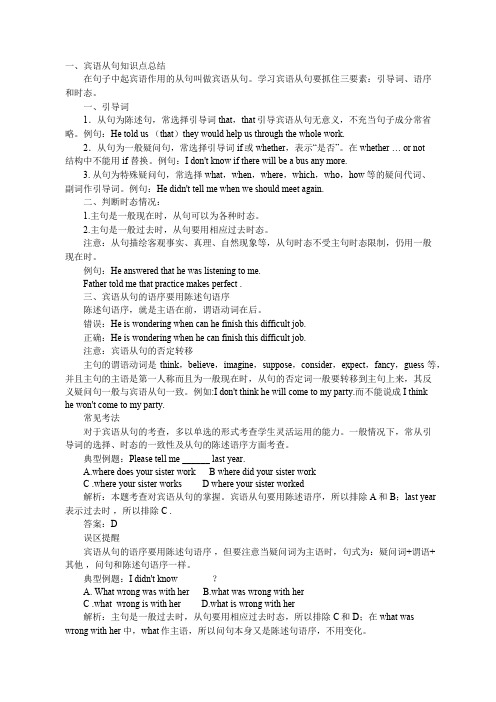
一、宾语从句知识点总结在句子中起宾语作用的从句叫做宾语从句。
学习宾语从句要抓住三要素:引导词、语序和时态。
一、引导词1.从句为陈述句,常选择引导词that,that引导宾语从句无意义,不充当句子成分常省略。
例句:He told us (that)they would help us through the whole work.2.从句为一般疑问句,常选择引导词if或whether,表示“是否”。
在whether … or not结构中不能用 if 替换。
例句:I don't know if there will be a bus any more.3. 从句为特殊疑问句,常选择what,when,where,which,who,how等的疑问代词、副词作引导词。
例句:He didn't tell me when we should meet again.二、判断时态情况:1.主句是一般现在时,从句可以为各种时态。
2.主句是一般过去时,从句要用相应过去时态。
注意:从句描绘客观事实、真理、自然现象等,从句时态不受主句时态限制,仍用一般现在时。
例句:He answered that he was listening to me.Father told me that practice makes perfect .三、宾语从句的语序要用陈述句语序陈述句语序,就是主语在前,谓语动词在后。
错误:He is wondering when can he finish this difficult job.正确:He is wondering when he can finish this difficult job.注意:宾语从句的否定转移主句的谓语动词是think,believe,imagine,suppose,consider,expect,fancy,guess等,并且主句的主语是第一人称而且为一般现在时,从句的否定词一般要转移到主句上来,其反义疑问句一般与宾语从句一致。
- 1、下载文档前请自行甄别文档内容的完整性,平台不提供额外的编辑、内容补充、找答案等附加服务。
- 2、"仅部分预览"的文档,不可在线预览部分如存在完整性等问题,可反馈申请退款(可完整预览的文档不适用该条件!)。
- 3、如文档侵犯您的权益,请联系客服反馈,我们会尽快为您处理(人工客服工作时间:9:00-18:30)。
简单句和复合句一、从简单词到复合句主语句子充当主语主语从句宾语句子充当宾语宾语从句句词性从句表语句子充当表语表语从句同位语句子充当同位语同位语从句三大类基本从句定语句子充当定语定语从句状语句子充当状语状语从句Example:技术类型:1. I really need to learn how to concentrate/focus on one thing at a time to improve the efficiency of the workThe goal of the code change on PE load line was that there is no code change in the CI package built.2. Assuming that MSRN keeps unchanged as long as it stays in the same VLR area, a copy of MSRN can be held on HLR and only needs to be updated when the UE moves to a new VLR area.3. Calls that were still in the alerting state or on hold were not transferred. Calls where the subscriber was thecontroller of a conference call may still be transferred per the 3GPP procedures, however, the fact that thesubscriber may be the controller for a conference was not known to the MSC, so the decision to allow such a call tobe transferred would be up to the SCC AS.4. Upon receipt of a SIP INFO, if the body has the Content-Type header containing‘application/vnd.3gpp.state-and-event-info+xml’ and a XML body compliant to the XML schema specified in the TS24.237 Section D.2 with the state-info XML element containing ‘early’ and direction XML element containing ‘i the WCS shall perform the followings.5. She didn’t realize the fact.(The girl who was taken care of by her grandmother)I didn't realize how special my mother was until I became anadult.二.宾语从句中引导词的用法在复合句中作主句的宾语,引导词有:连词:that (that 常可省略),whether, if代词:who, whose, what ,which副词:when ,where, how, why 等。
(一)that引导的宾语从句(在非正式场合that可以省略)可跟that从句做宾语的动词有:say, think, insist, wish, hope, demand, imagine, wonder, know, suppose, see, believe, agree, admit, deny,expect, explain, order, command, feel, dream, suggest, hear, mean, notice, prefer, request, require, propose,declare, report等。
- 注意事项:当主句谓语动词是 think, believe, suppose, expect 等词,而宾语从句的意思是否定时,常把否定转移至主句表示。
例句:I don’t think it is right for him to treat you like that.在以下情况中that不能省略1.当句中的动词后接多于两个由that引导的宾语从句时,第一个that可省,但后面的that不可省。
例句:He said (that) you were too young to understand the matter and that he was asked not to tell you.2.当主句的谓语动词与that宾语从句之间有插入语时,that一般不可省。
例句:Just then I noticed, for the first time, that our master was wearing his fine green coat and his black silk cap.3.当that从句是双宾语中的直接宾语时,that不可省。
例句:I can’t tell him that his mother died.注意事项:许多带复合宾语的句子,that引导的宾语从句经常移到句子后部,而用it作形式宾语。
例句:I find it necessary that we should do the homework on time.(二)由whether,if 引导的宾语从句由whether(if)引导的宾语从句,实际上是一般疑问句演变而来的。
意思是“是否”。
宾语从句要用陈述句语序。
一般说来,在宾语从句中whether与if可以互换使用,但在特殊情况下if与whether是不能互换的。
例句:I wonder whether(if) they will come to our party.只能用whether,不能用if引导的宾语从句1.在带to的不定式前例句:We decided whether to walk there.2.在介词的后面例句:I’m thinking of whether we should go to see the film.3.在动词后面的宾语从句时例句:We discussed whether we had a sports meeting next week4.直接与or not连用时例句:I can’t say whether or not thet can come on time.只能用if不能用whether引导的宾语从句1.if引导条件状语从句,意为“如果”例句:The students will go on a picnic if it is sunny.2.if引导否定概念的宾语从句时例句:He asked if I didn’t come to school yesterday.3.引导状语从句even if(即使)和as if(好象)时例句:He talks as if he has known all about it.(三)连接代词和连接副词引导的宾语从句这样的宾语从句实际上是由特殊疑问句变化而来的,宾语从句要用陈述句语序。
用于这种结构的动词常常是:see, say, tell, ask, answer, know, decide, show, find out, imagine, suggest, doubt, wonder, discover, understand, inform,advise等。
英语中的连接代词有:who,whom,whose,which,what,在句中担任主语、宾语、定语或者表语。
例句:Can you tell me whom you are waiting for?英语中的连接副词有:when,where,why,how,在句中担任状语的成分。
例句:None of us knows where these new parts can be bought.(四)宾语从句的语序宾语从句的语序是陈述句语序即:连接代词/副词+主语+谓语+其他成分。
例句如下:1.I don’t know what they are looking for.2.Could you tell me when the train will leave?3.Can you imagine what kind of man he is?(五)宾语从句的时态- 1.主句是一般现在时,从句根据实际情况使用任何时态。
例句:The headmaster hopes everything goes well.2.主句是过去时态,从句须用过去时态的某种形式。
例句:She was sorry that she hadn’t finished her work on time.3.当宾语从句表示的是一个客观真理或者事实时,即使主句是过去时,从句也用一般现在时态。
例句:The teacher told his class that light travels faster than sound.(六)宾语从句的特点1.宾语从句可以作及物动词、介词及形容词的宾语。
2.宾语从句的语序一律用陈述句语序。
3.连接词that引导宾语从句在句中无词义,不充当句子成份,多数情况下可以省略。
4.whether 和 if 都可引导宾语从句,但 whether后可紧跟or not;whether从句可作介词的宾语。
5.如果从句太长,可以用形式宾语it.三状语从句用法状语从句主要用来修饰主句或主句的谓语。
一般可分为九大类,分别表示时间、地点、原因、目的、结果、条件、让步、比较和方式。
尽管种类较多,但由于状语从句与汉语结构和用法相似,所以理解和掌握它并不难。
状语从句的关键是要掌握引导不同状语从句的常用连接词和特殊的连接词即考点。
现分别列举如下:1、时间状语从句常用引导词:when, as, while, as soon as, while, before, after, since , till, until特殊引导词:the minute, the moment, the second, every time, the day,the instant, immediately , directly, nosooner … than, hardly …when, scarcely … whenI didn't realize how special my mother was until I became an adult.While John was watching TV, his wife was cooking.The children ran away from the orchard(果园) the moment they saw the guard.No sooner had I arrived home than it began to rain.Every time I listen to your advice, I get into trouble.2、地点状语从句常用引导词:where特殊引导词:wherever, anywhere, everywhereGenerally, air will be heavily polluted where there are factories.- Wherever you go, you should work hard.3、原因状语从句常用引导词:because, since, as, for特殊引导词:seeing that, now that, in that, considering that, given that, considering that, as much as, so much asMy friends dislike me because I'm handsome and successful.Now that everybody has come, let's begin our conference.The higher income tax is harmful in that it may discourage people from trying to earn more.Considering that he is no more than 12 years old, his height of 1.80 m is quite remarkable.4、目的状语从句常用引导词:so that, in order that特殊引导词:lest, in case, for fear that,in the hope that, for the purpose that, to the end thatThe boss asked the secretary to hurry up with the letters so that he could sign them.The teacher raised his voice on purpose that the students in the back could hear more clearly.5、结果状语从句常用引导词:so that, so… that, such … that,特殊引导词:such that, to the degree that, to the extent that, to such a degree that,He got up so early that he caught the first bus.It's such a good chance that we must not miss it.To such an degree was he excited that he couldn't sleep last night.6、条件状语从句常用引导词:if, unless,特殊引导词:as/so long as, only if, providing/provided that, suppose that, in case that, on condition thatWe'll start our project if the president agrees.You will certainly succeed so long as you keep on trying.Provided that there is no opposition, we shall hold the meeting here.7、让步状语从句常用引导词:though, although, even if, even though特殊引导词: as(用在让步状语从句中必须要倒装),while ( 一般用在句首),no matter …, in spite of the fact that,while, whatever, whoever, wherever, whenever, however, whicheverMuch as I respect him, I can't agree to his proposal.尽管我很尊敬他, 我却不同意他的建议。
